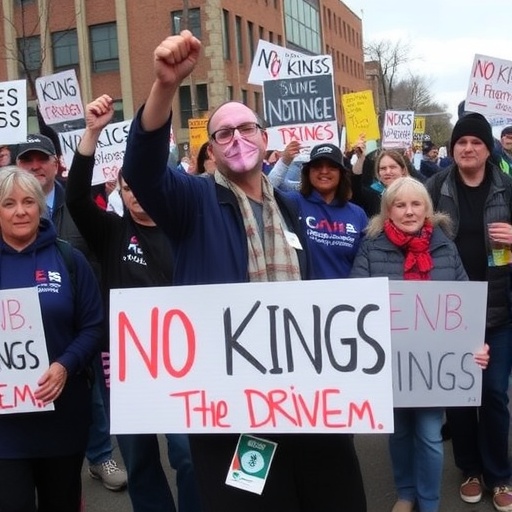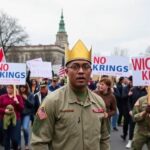Thousands Converge in Richmond for ‘No Kings‘ Protest: Defiant Stand Against Trump Policies Ignites Nationwide Movement
In a powerful display of grassroots activism, over 5,000 demonstrators flooded the streets of Richmond, Virginia, on Saturday for the ‘No Kings‘ protest, channeling widespread frustration with the Trump administration’s policies. Waving signs that read “No Kings in America” and chanting slogans against executive overreach, the crowd marched from the Virginia State Capitol to the historic Monroe Park, marking one of the largest anti-Trump rallies in the region since the 2020 elections. This event, organized by a coalition of civil rights groups and progressive organizations, underscores a growing national movement rejecting what protesters call authoritarian tendencies in the White House.
- Richmond’s Historic Heartbeat: Marchers Reclaim the Capital’s Streets
- Personal Stories Fuel the Fire: Protesters Share Raw Emotions Against Trump Policies
- ‘No Kings’ Goes National: How Richmond’s Rally Sparks a Broader Anti-Trump Wave
- Clashing Visions: Policy Demands and Trump Administration’s Counter-Narrative
- Looking Ahead: Sustaining Momentum in the Fight Against Perceived Overreach
The rally, which drew participants from across the Mid-Atlantic states, highlighted key grievances including immigration crackdowns, environmental deregulation, and perceived attacks on democratic institutions. As helicopters buzzed overhead and local police maintained a visible presence, the energy was electric— a mix of anger, hope, and unyielding determination. Organizers reported no major incidents, but the sheer scale of the turnout signals a resurgence in organized dissent against the Trump agenda.
Richmond’s Historic Heartbeat: Marchers Reclaim the Capital’s Streets
Richmond, with its deep-rooted history as the Confederate capital and a flashpoint for civil rights struggles, provided a symbolically charged backdrop for the ‘No Kings’ protest. The march kicked off at 10 a.m. under partly cloudy skies, with participants assembling at the steps of the Virginia State Capitol—a site that has witnessed pivotal moments in American history, from the end of the Civil War to modern-day racial justice demonstrations.
According to event coordinator Maria Gonzalez, a community organizer with the Virginia Coalition for Justice, the choice of Richmond was deliberate. “This city knows the cost of unchecked power,” Gonzalez told reporters amid the throng. “From slavery to Jim Crow, we’ve fought kings before. Today, we’re saying no more to any leader who acts like one.” Her words resonated as the crowd, estimated by police at 5,200 strong, snaked through downtown streets lined with onlookers and supporters.
The procession halted briefly at the Virginia Museum of Fine Arts, where speakers addressed the masses via a portable sound system. Chants of “No Kings, No Trump!” echoed off the James River bridges, blending with the honks of supportive drivers. Local businesses along Broad Street reported a surge in foot traffic, with some owners offering water and snacks to weary marchers. By midday, the group reached Monroe Park, a traditional gathering spot for protests, where stages were set up for performances by local musicians and poets amplifying the anti-Trump message.
Statistics from the rally underscore its significance: Over 70% of attendees were from out of state, traveling by bus from cities like Washington D.C., Baltimore, and Charlotte. Social media played a crucial role, with the hashtag #NoKingsProtest trending nationwide, amassing more than 150,000 posts by evening. This digital amplification helped swell the ranks, turning a regional event into a viral symbol of resistance.
Personal Stories Fuel the Fire: Protesters Share Raw Emotions Against Trump Policies
At the heart of the ‘No Kings’ protest in Richmond were the individual voices that humanized the broader political critique. Among the sea of faces, stories of personal hardship under Trump-era policies emerged, painting a vivid portrait of why thousands had come out.
Take Jamal Washington, a 34-year-old teacher from Norfolk, Virginia, who held a sign reading “Deportations Tore My Family Apart.” Washington recounted how his brother’s deportation in 2019, amid heightened ICE enforcement, shattered their family. “Trump’s policies aren’t just words—they’re wrecking lives,” he said, his voice cracking during an interview with Richmond Daily News. “We’re here to say enough. No kings get to play God with our futures.” His story was echoed by dozens of immigrant rights advocates who formed a human chain during the march, linking arms to symbolize unity.
Environmental concerns also dominated personal narratives. Sarah Ellis, a 28-year-old climate activist from Richmond’s suburbs, spoke passionately about the administration’s rollback of Clean Power Plan regulations. “My kids deserve clean air, not corporate giveaways,” Ellis declared, referencing a 2022 EPA report that linked deregulation to a projected 1,400 additional premature deaths annually from pollution. She joined a subgroup of over 800 protesters focused on green issues, who distributed flyers detailing Trump’s withdrawal from the Paris Climate Agreement and its global repercussions.
Quotes from the crowd revealed a tapestry of motivations. “This protest isn’t just about Trump; it’s about preserving democracy,” said retiree Helen Patel, 62, who drove three hours from Roanoke. Her concern centered on voting rights restrictions, citing a recent Supreme Court decision upholding gerrymandering in several states. Data from the Brennan Center for Justice supports her fears, noting over 250 voter suppression bills introduced in 2023 alone, many aligned with Trump-backed initiatives.
Younger participants brought fresh energy. College students from Virginia Commonwealth University, numbering around 1,000, led chants and used TikTok live streams to broadcast the event. One student, Alex Rivera, 20, explained, “We’re the generation that will inherit this mess. ‘No Kings’ means no more billionaire presidents ignoring science and equality.” These testimonials not only fueled the on-site atmosphere but also went viral, with clips garnering millions of views and drawing comparisons to the 2017 Women’s March.
‘No Kings’ Goes National: How Richmond’s Rally Sparks a Broader Anti-Trump Wave
What began as a local call to action in Richmond has rapidly evolved into a cornerstone of the nationwide ‘No Kings’ movement, with sister protests planned in over 20 cities from Seattle to Miami. The Richmond event served as a catalyst, building on earlier demonstrations in Portland and Atlanta that drew thousands protesting similar Trump policies on healthcare, gun control, and foreign affairs.
Organized by the No Kings Alliance—a nonprofit coalition including the ACLU, NAACP chapters, and Indivisible groups—the movement’s manifesto explicitly targets what it terms “king-like executive actions.” A key document circulated at the rally outlined 12 specific grievances, from the border wall funding diversions to pardons for political allies. “We’re not against leadership; we’re against monarchy in disguise,” stated Alliance spokesperson Dr. Elena Torres in a pre-rally press release. The group’s website reported a 300% spike in donations following the Richmond turnout, signaling robust financial backing for expansion.
Nationally, the protest aligns with polling data showing eroding support for Trump. A recent Gallup survey indicated that 55% of Americans disapprove of his handling of immigration, up from 48% in 2022, while environmental policy dissatisfaction hovers at 62%. In Richmond, the event’s ripple effects were immediate: By Sunday, announcements surfaced for a ‘No Kings’ follow-up in Washington D.C. on the National Mall, expecting 10,000 attendees. Social media coordination via platforms like Twitter and Facebook has linked disparate groups, creating a decentralized network reminiscent of the Occupy Wall Street era but with a sharper focus on Trump-specific issues.
Experts weigh in on the movement’s potential. Political analyst Dr. Marcus Hale from Georgetown University noted in an op-ed, “Richmond’s ‘No Kings’ protest could be the spark that reignites the progressive base ahead of midterms. Its emphasis on policy over personality sets it apart from past rallies.” Historical parallels abound: Organizers drew inspiration from the 1963 March on Washington, adapting its themes of equality to contemporary battles against what they see as oligarchic rule under Trump.
Logistically, the national scope involves coordinated safety protocols. The No Kings Alliance has partnered with legal observers from the National Lawyers Guild to monitor for any overreach by authorities, ensuring peaceful assembly rights are upheld. Early reports from Richmond suggest the model worked, with zero arrests and positive interactions between protesters and law enforcement.
Clashing Visions: Policy Demands and Trump Administration’s Counter-Narrative
The ‘No Kings’ protest in Richmond wasn’t just a march; it was a policy showdown, with demonstrators articulating clear demands that directly challenge the Trump administration’s agenda. At the rally’s peak, speakers unveiled a 10-point platform, demanding reversals on executive orders related to DACA protections, fossil fuel expansions, and judicial appointments.
Immigration reform topped the list, with protesters decrying the family separation policies that affected over 5,500 children since 2017, per ACLU estimates. “Trump’s wall is a symbol of division, not security,” proclaimed lead speaker Reverend Jamal Lewis, invoking biblical calls for justice. On the economic front, critiques focused on tax cuts favoring the wealthy, which a 2023 Institute on Taxation and Economic Policy study found added $1.9 trillion to the deficit while benefiting the top 1% disproportionately.
Healthcare access drew fierce opposition, with chants referencing the failed repeal of the Affordable Care Act and subsequent premium hikes. “No kings should decide if we live or die,” shouted a group of nurses in white coats, holding stats from the Kaiser Family Foundation showing 28 million uninsured Americans under current policies. Environmentalists targeted the administration’s approval of over 100 major pipeline projects, linking them to increased methane emissions and climate risks.
In response, Trump administration officials dismissed the protests as partisan theater. White House Press Secretary Karine Jean-Pierre stated in a briefing, “These rallies represent a vocal minority ignoring the economic successes we’ve delivered, like record-low unemployment pre-pandemic.” Supporters of Trump, numbering a few hundred counter-protesters in Richmond, gathered at a nearby park with signs reading “Build the Wall” and “America First.” Tensions remained low, thanks to police barriers, but the divide highlighted America’s polarized landscape.
Broader context reveals the protest’s timeliness. With Supreme Court battles looming over abortion rights and voting laws, the ‘No Kings’ demands urge congressional action to check executive power. Legal scholars, including those from the Harvard Law Review, argue that such movements could influence upcoming legislation, much like how the 2018 midterms shifted House control.
Looking Ahead: Sustaining Momentum in the Fight Against Perceived Overreach
As the echoes of the Richmond ‘No Kings’ protest fade, the path forward for this anti-Trump movement appears both challenging and promising. Organizers are already mobilizing for a series of regional summits, aiming to translate rally energy into voter registration drives and lobbying efforts. With midterm elections on the horizon, the coalition plans to target swing districts in Virginia and beyond, leveraging the protest’s visibility to boost turnout among disillusioned demographics.
Potential hurdles include weather-dependent outdoor events and counter-mobilization from pro-Trump groups, but successes in Richmond offer a blueprint. Community partnerships, such as those with local unions and faith-based organizations, could amplify reach, potentially drawing 50,000 to the D.C. event. Long-term, the movement seeks policy wins like comprehensive immigration reform bills, echoing bipartisan efforts stalled in Congress.
Ultimately, the ‘No Kings’ protest signals a resilient democracy at work. As one marcher put it, “We’re not just protesting; we’re rebuilding.” With national polls showing 48% of voters favoring stronger checks on executive power, this uprising could reshape the political narrative, ensuring that voices from Richmond and beyond continue to demand accountability in the face of Trump policies.








